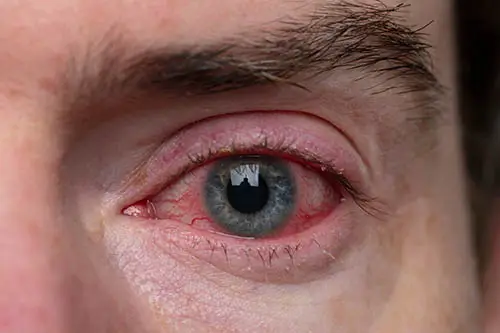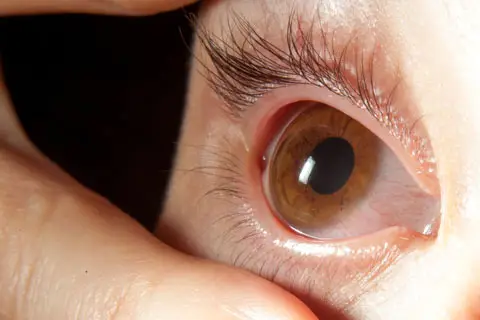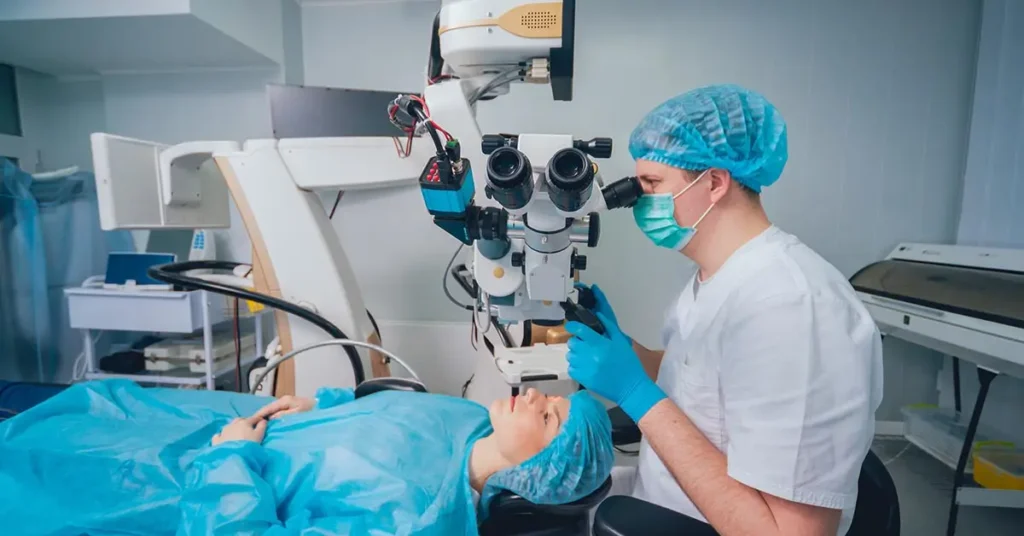Are you considering PRK surgery to correct your vision? While PRK is a highly effective and safe procedure, like any surgery, it comes with potential complications and recovery phases that you should be aware of. In this blog, we’ll dive into the common complications and long-term side effects you might encounter after PRK surgery. So, let’s dive in and explore what you can expect and how to best prepare for life after PRK surgery.
Contents
Immediate Complications After PRK Surgery

Photorefractive Keratectomy (PRK) surgery is a proven method for correcting vision, but like any surgical procedure, it comes with some immediate postoperative risks that patients need to be prepared for. Here are some of the most common immediate complications.
- Pain and Discomfort: Unlike other types of refractive surgery, PRK involves the removal of the cornea’s outer layer, which can lead to moderate pain and discomfort for a few days after the surgery.
- Light Sensitivity: After PRK, patients often experience heightened sensitivity to light. This can be intense in the days immediately following the procedure.
- Vision Haze: Some patients may notice a haze in their vision during the initial healing process. This is due to the changes in the cornea as it heals and usually resolves within a few weeks to months.
- Tearing and Foreign Body Sensation: It’s common for patients to experience increased tear production and a sensation of having something in their eye.
During the initial recovery phase, it’s crucial for patients to follow their eye care provider’s instructions closely, attend all follow-up appointments, and report any severe or worsening symptoms promptly. Proper post-operative care is essential to minimize these immediate risks and promote a smooth, quick recovery.
Long-Term Side Effects of PRK

While PRK surgery offers significant benefits for vision correction, some patients may experience long-term side effects.
- Dry Eyes: One of the most common long-term effects of PRK is dry eyes. This condition can persist for several months or even longer. The nerves in the cornea are disrupted during the reshaping process, which can decrease tear production.
- Glare and Halos: Some patients may notice glare and halos around lights, particularly at night, which can last for months following surgery. These visual disturbances usually improve as the eye heals and the cornea stabilizes. However, if they continue to persist and affect quality of life.
- Contrast Sensitivity: A decrease in contrast sensitivity can occur after PRK, making it difficult to discern shades of gray or see in low-light conditions. This usually improves within six months as the eye heals, but if it remains a problem, specialized lenses or further corrective surgery may be considered.
- Regression: In some cases, there can be a regression of the initial correction, leading to a gradual return of the refractive error. This is less common but can occur, especially in patients with high initial prescriptions. Additional treatments or enhancement surgeries may be required to correct this regression.
Infection Risks Associated with PRK
Infection following PRK (Photorefractive Keratectomy) surgery is a rare complication, but it is serious when it occurs and requires prompt attention to prevent long-term damage to the eye.
Signs of Infection to Monitor For:
- Increased Redness
- Pain
- Unusual discharge
- Sudden decrease in vision or the appearance of new visual disturbances
- Increased swelling around the eyes
If any signs of infection are noticed, it is crucial to contact an eye care professional immediately. Regular follow-up appointments after PRK are essential to ensure the eyes are healing correctly and to catch any issues, like infections, early.
Rare Complications After PRK Surgery

While PRK surgery is generally safe and effective, some rare complications can occur post-surgery. Awareness of these potential issues is important for early detection and management:
- Corneal Haze: This is a common but usually mild side effect where the cornea appears cloudy or foggy as it heals. In rare cases, the haze can be significant enough to impair vision, requiring medical treatment to resolve.
- Corneal Scarring: In very rare instances, abnormal healing can lead to scarring on the cornea. This scarring can affect the clarity of vision and might necessitate additional surgical interventions to correct.
- Corneal Ulcers: Though extremely rare, corneal ulcers can occur, especially if post-operative care instructions regarding hygiene and medication are not followed properly. These ulcers are serious and can lead to severe vision loss if not treated promptly.
- Night Vision Problems: Some patients may experience persistent night vision problems such as glare, halos, and difficulty seeing in low light. While often temporary, these symptoms can be permanent in rare cases and may require further treatment to manage.
- Endophthalmitis: This is a very rare but severe infection that can occur inside the eye. Endophthalmitis is a medical emergency that requires immediate treatment to prevent permanent vision loss.
Promptly reporting any unusual symptoms or changes in vision can help in early detection and treatment of these rare complications, ensuring the best possible outcome from the surgery.
How To Manage These Complications After PRK Surgery
Here’s a comprehensive list of measures and tips to effectively manage side effects and complications after PRK surgery:
- Use anti-inflammatory eye drops as prescribed to prevent severe corneal haze.
- Consider medical treatments such as steroid eye drops or phototherapeutic keratectomy if corneal haze affects vision.
- Attend regular follow-up visits to detect signs of abnormal healing that could lead to scarring.
- Explore treatment options for corneal scarring, including corneal collagen cross-linking or surgical revision.
- Maintain strict hygiene with contact lenses and follow all post-operative care instructions to prevent corneal ulcers.
- Initiate aggressive antibiotic therapy immediately at the first sign of a corneal ulcer.
- Use anti-reflective coated glasses at night to help reduce glare and halos if experiencing night vision problems.
- Seek further evaluation and possibly corrective lenses or additional laser treatments if night vision issues persist.
- Recognize symptoms of endophthalmitis (severe pain, redness, vision loss) and seek immediate medical attention.
- Treat endophthalmitis with intravitreal injections of antibiotics and possibly corticosteroids, along with systemic antibiotics.
- Adhere to all scheduled follow-up appointments to allow your eye care provider to monitor your healing process.
- Monitor your symptoms closely and report any changes promptly to catch complications early.
- Accurately use prescribed medications as directed to prevent complications and manage any that arise.
These steps will help you manage the side effects and complications associated with PRK surgery, ensuring a smoother recovery and maintaining optimal eye health.
Conclusion
Photorefractive Keratectomy (PRK) is celebrated for its ability to significantly enhance vision, with the majority of patients achieving up to 6/6 vision post-procedure. Known for its high patient satisfaction rates, PRK stands as one of the safest elective vision correction surgeries available today.
While it is true that complications can occur, they are generally rare and typically manageable with the right care strategies. Most patients are very pleased with the outcomes of their surgery, enjoying substantially improved vision. This satisfaction underscores PRK’s effectiveness and the transformative impact it can have on a person’s quality of life, making it a compelling option for those seeking a long-term solution to refractive errors.
Experience the freedom of clear vision with Lasik Surgery at EyeMantra. Book your free appointment now at +91 9711116605 and take the first step towards a life with improved vision.
